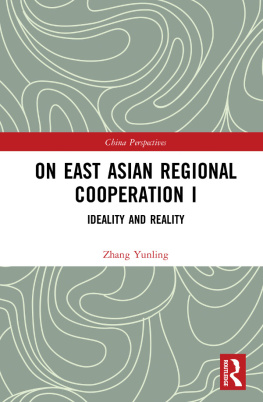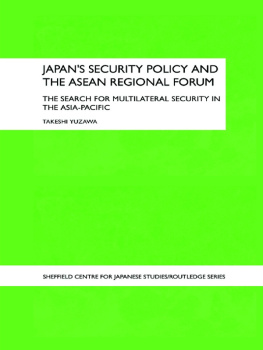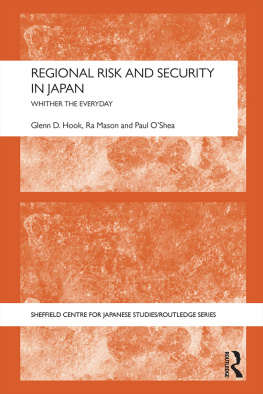Saori N. Katada - Japans New Regional Reality
Here you can read online Saori N. Katada - Japans New Regional Reality full text of the book (entire story) in english for free. Download pdf and epub, get meaning, cover and reviews about this ebook. publisher: Columbia University Press, genre: Politics. Description of the work, (preface) as well as reviews are available. Best literature library LitArk.com created for fans of good reading and offers a wide selection of genres:
Romance novel
Science fiction
Adventure
Detective
Science
History
Home and family
Prose
Art
Politics
Computer
Non-fiction
Religion
Business
Children
Humor
Choose a favorite category and find really read worthwhile books. Enjoy immersion in the world of imagination, feel the emotions of the characters or learn something new for yourself, make an fascinating discovery.

- Book:Japans New Regional Reality
- Author:
- Publisher:Columbia University Press
- Genre:
- Rating:5 / 5
- Favourites:Add to favourites
- Your mark:
- 100
- 1
- 2
- 3
- 4
- 5
Japans New Regional Reality: summary, description and annotation
We offer to read an annotation, description, summary or preface (depends on what the author of the book "Japans New Regional Reality" wrote himself). If you haven't found the necessary information about the book — write in the comments, we will try to find it.
Japans New Regional Reality — read online for free the complete book (whole text) full work
Below is the text of the book, divided by pages. System saving the place of the last page read, allows you to conveniently read the book "Japans New Regional Reality" online for free, without having to search again every time where you left off. Put a bookmark, and you can go to the page where you finished reading at any time.
Font size:
Interval:
Bookmark:

JAPANS NEW REGIONAL REALITY
CONTEMPORARY ASIA IN THE WORLD
David C. Kang and Victor D. Cha, Editors
This series aims to address a gap in the public-policy and scholarly discussion of Asia. It seeks to promote books and studies that are on the cutting edge of their disciplines or promote multidisciplinary or interdisciplinary research but are also accessible to a wider readership. The editors seek to showcase the best scholarly and public-policy arguments on Asia from any field, including politics, history, economics, and cultural studies.
For a complete list of books in the series, see .
Japans New Regional Reality
GEOECONOMIC STRATEGY IN THE ASIA-PACIFIC
Saori N. Katada

Columbia University Press
New York
Columbia University Press
Publishers Since 1893
New York Chichester, West Sussex
cup.columbia.edu
Copyright 2020 Columbia University Press
All rights reserved
E-ISBN 978-0-231-54908-0
Library of Congress Cataloging-in-Publication Data
Names: Katada, Saori N., author.
Title: Japans new regional reality : geoeconomic strategy in the Asia-Pacific / Saori N. Katada.
Description: New York : Columbia University Press, [2020] | Includes bibliographical references and index.
Identifiers: LCCN 2019047405 (print) | LCCN 2019047406 (ebook) | ISBN 9780231190725 (cloth) | ISBN 9780231190732 (paperback)
Subjects: LCSH: Regional economicsJapan. | GeopoliticsJapan. | JapanForeign economic relationPacific Area. | Pacific AreaForeign economic relationsJapan. | JapanEconomic policy1989 | Pacific AreaEconomic conditions.
Classification: LCC HF1602.15.P3 K38 2020 (print) | LCC HF1602.15.P3 (ebook) | DDC 337.520182/3dc23
LC record available at https://lccn.loc.gov/2019047405
LC ebook record available at https://lccn.loc.gov/2019047406
A Columbia University Press E-book.
CUP would be pleased to hear about your reading experience with this e-book at .
Cover image: Planet Observer/UIG/Bridgeman Images
Cover design: Chang Jae Lee
GDP of Major Regions and Countries, 19902018
Share of World GDP: United States, China, and Japan, 19602018
Regional GDP and Changing Shares of Japan and China, 19892018
Japans Export Destinations, 19942018
Growth of Intraregional Trade in Asia, 19852018
Balance Between Private and Public Sectors, 19802018
Keidanren Political Contributions to the LDP and DPJ, 19912017
Outward FDI Flows from Japan by Region, 19852017
Share of Japanese Firms with Overseas Operations and Overseas-to-Total Production Ratio, 19872018
Increase in Bilateral and Regional FTAs, 19582018
Dollar-Yen Exchange Rate, 19802019
Reporting Banks Foreign Claims in Asia: Japan and Other Advanced Countries, 19842018
Samurai Bond Issuances, 19902018
Total ODA by All Donors to All Recipients, 19952017
Tied, Partially Untied, and Untied Aid, 19792017
Public Opinion Polls on Foreign Aid, 19892018
Stylized Summary of Japans Regional Economic Strategy in the Twenty-First Century
Chronology of Major Economic Events, 19902019
Japans EPA Partners: Status and Trade Shares as of 2018
FTA Utilization for Exports in 2014
Currency Denominations of Japans Foreign Trade by Region, 1980s and 1990s
Top Ten ODA Donors, 19852002
amakudari | descending from heaven; government officials obtaining jobs in the private sector or public corporations after retirement |
|---|---|
futs no kuni | normal nation |
gaiatsu | foreign pressure |
gos sendan hshiki | convoy system |
gysei shid | administrative guidance |
habatsu | Liberal Democratic Party faction |
kantei gaik | Prime Ministers Office diplomacy |
Keidanren | Japan Business Federation |
keiretsu | business conglomerate |
keizai kyryoku | economic cooperation |
kokka kmuin rinri h | National Ethics Law for Central Government Public Servants |
kdka | hollowing out |
naiatsu | internal pressure |
sanmi ittai | development trinity approach |
shingi-kai | advisory (or deliberation) councils |
tatewari gysei | vertical administration or compartmentalization |
tokushu-hjin | special public corporation |
yen-daka | yen appreciation or strong yen |
yonsh taisei | four-ministry system |
zaimukan | vice minister of international affairs at the Ministry of Finance |
zaisei tyushi | fiscal loan investment program |
zoku | Liberal Democratic Party policy tribe |
I have observed and analyzed Japan and its foreign policy from many vantage points as a scholar, teacher, and Japanese national living outside the country. Now is an exciting time, with Japan facing a new regional reality in the Asia-Pacific as China rises and the U.S. commitment continues to slip. The Japanese government must see a vast opening and step up its regional engagement so that it can keep the regional economic order intact. This is the new challenge that has given rise to Japans geoeconomic strategy.
When a book project takes as long as this one has taken, the debts the author incurs accumulate so much that there is no way either to repay all of them or to cover everyone in a few pages of acknowledgment. Nonetheless, I would first like to thank all the mentors who have guided me on this project and others over many years. I am especially grateful to Laurie Brand, Jerry Cohen, Ellen Frost, Masahiro Kawai, Tim McKeown, T. J. Pempel, Barbara Stallings, and Shu Urata.
It is probably impossible to list all the brilliant and dedicated scholars, researchers, government officials, journalists, and experts from international organizations, businesses, and NGOs who have given their valuable time to share their insights with me. In particular, I am grateful to Izumi Ohno, Junichi Sugawara, and Akihiko Tamura, who have always been my go-to people when I have questions on Japanese foreign economic policy.
During the writing stage, many of my academic colleagues were kind enough to read my manuscript at various points. In a manuscript review workshop hosted by the Center for International Studies in 2016, discussants Miles Kahler and William Grimes gave me valuable comments. I also thank all the workshop participants for their critiques. As I worked to revise the manuscript, several more people generously provided insightful suggestions; I thank in particular Mireya Sols and Gene Park. Not only are they generous scholars who spent hours reading the manuscript, they are also both my dear coauthors, who make my usually solitary scholars life much more enjoyable. In addition, I am grateful for the advice of Hyoung-kyu Chey, Jacques Hymans, and Harukata Takenaka, each of whom read some of the chapters. I also benefited greatly from the thorough and constructive suggestions from the two anonymous reviewers at Columbia University Press. I thank the presss editor, Caelyn Cobb, and the series editors, Dave Kang and Victor Cha.
Font size:
Interval:
Bookmark:
Similar books «Japans New Regional Reality»
Look at similar books to Japans New Regional Reality. We have selected literature similar in name and meaning in the hope of providing readers with more options to find new, interesting, not yet read works.
Discussion, reviews of the book Japans New Regional Reality and just readers' own opinions. Leave your comments, write what you think about the work, its meaning or the main characters. Specify what exactly you liked and what you didn't like, and why you think so.






